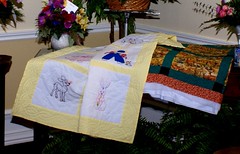My mother-in-law, Edna Gertrude Ireton (nee Gardiner) passed away on February 10, 2010 in her 93rd year. Edna had spent the last 15 years in a wheelchair as the result of a stroke which had left her paralyzed on the left side. Up until the Fall of 2008 when she moved to Lanark Lodge in Perth, Ontario she had lived in her own home near Drummond Centre with the assistance her son, Bob, who lived with her and home care workers who came to the house both morning and evening.
Edna was raised in the country, married in the country, raised her children (Helen, Allan, Bob, Barbara, Beverly, Dianne and John) in the country, lived her whole life in the country. In 2008, at the prompting of a daughter-in-law, she wrote some short notes concerning her life. I'd like to include a couple of them here.
First some comments concerning her youth:
"As a young girl I had a good sense of humour. Quiet. We didn't have much in the line of entertainment. We learned to play cards young. Sometimes some of us would gather at someone's house. If we were lucky we had live music, a violin, a tin whistle. We learned to dance. My father and two of my brothers were good step dancers.And what it was like being a farmer's wife:
I had three brothers older than myself, one sister younger. I never went to school after Grade 8. Back then it was Senior 4th Grade. My sister went to high school, then to business college. Got a job bookkeeping for a local business. I stayed at home, helped my mother. Money was scarce. You learned to save your pennies until you had enough to buy whatever you wanted or needed. You helped your neighbours when needed. Didn't always get paid. We didn't have the opportunities that the young people have today. I was 25 yrs old when I married in May 1942."
"A typical day for me in my early married life would be to get up in early morning and help milk the cows by hand, feed calves and the hens or chickens before breakfast. There was a baby to look after, feed and dress. Washing to be done.Edna's passion was quilting and even after suffering her stroke and having the use of only one hand she continued to quilt with the help of two of her daughters, Helen and Barbara, and some of her quilting friends. All her children, grandchildren and some of her great-grandchildren received at least one of Edna's quilts during her lifetime.
Had to have a noon meal ready the included potatoes and meat. Back then in the 1940s it was salt pork. It was stored in a salt brine in the basement. You had to dig a piece out, slice it by hand, parboil it in milk and water, then fry the slices. It tasted good enough. A lot of work. You had to have desert, pudding, pie or cake. Supper was much the same.
In the summer time there was always extra, the garden. Men had the crops and hay. Women were often called upon to help. It was busy and tiresome. Not much money. I guess when you're young you can handle these things better. It was the way of life."
Unfortunately, the hands of the quilter have now been stilled but her legacy will live on in her beautiful creations.
At least that's how I see it from Between Keyboard and Chair
Don




